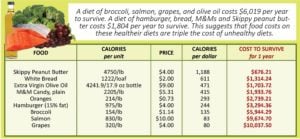A recent study in the New England Journal of Medicine…
showed a 30% reduction in the risk of stroke and heart attack among patients following a Mediterranean diet for five years as compared to a low-fat diet. Wow! This is better than taking Lipitor. What is the Mediterranean diet? Where did it get its silly name? Should we all eat this way?
Twenty-one countries surround the Mediterranean Sea, including places like Israel, Libya, Italy, Greece, Spain, and Morocco. Face it, the diet in all these places is very different. There can’t be a single diet based on the countries in the Mediterranean. In fact, this diet comes from a famous research project called the Seven Countries Study which was conducted from 1958–1970. The study was run by Ancel Keys, PhD, also inventor of the K-ration for the military. Dr. Keys majored in economics and political science at U.C. Berkeley and then went on to get two PhDs at Scripps in zoology and at Cambridge in physiology. He felt the Mayo Clinic was too lowbrow and spent his career at the University of Minnesota. Dr. Keys and his colleagues were struck by the huge variation in the rate of heart attack and stroke in different countries and wondered if the type of fat in the diet was the reason. In his study, Italy and Greece were the only Mediterranean countries and the best data came from Crete, most populous of the Greek Islands. Back in the 1960s, life there was very different. People ate fruit, vegetables, nuts, fish, and olive oil, and had much less fat from animal sources. They rode bicycles everywhere. They did not eat dessert or most bakery products. They did eat some cheese and sourdough bread, otherwise it was whole grains. They drank wine in moderation. Crete in the 1960s is where the diet and its name came from. Dr. Keys ate this way and lived to be 100.
Of course, it is wrong to say any nutrient is good or bad. Fat is good for you if it is olive oil but bad if it is bacon fat. Broccoli and oranges are carbohydrates, but they are good carbohydrates. Donuts are bad carbohydrates, except chocolate ones.
What Dr. Keys discovered is that even though many of the dishes served in Crete were “swimming in olive oil,” the people in that region had a low risk of heart attack. However, this research was observational. The next step would be a randomized trial where people were given the Mediterranean diet or some other diet to see what would happen.
The new study of the Mediterranean diet, which goes by the acronym PREDIMED (Prevención con Dieta Mediterránea), included 7447 people randomized to one of three diets. The first was a Mediterranean diet supplemented with lots of extra virgin olive oil given for free to study participants. The next was the same Mediterranean diet with lots of free tree nuts (raw and unsalted walnuts, hazelnuts, and almonds, but no peanuts which are not a “tree nut” but a legume). The control group was on a low fat diet and asked to eat more bread, rice, and pasta, but to cut way down on fat. That group received free kitchen implements instead of free food.
After five years, the differences in the rate of stroke and heart attack were so great that the study was stopped early because it was felt to be unethical to continue to keep 2500 Spaniards on a low-fat diet and send them free kitchen gadgets when they were having more strokes and heart attacks than their neighbors. These differences were huge to statisticians, but not as big to ordinary folks. The risk of stroke or heart attack was 0.8% per year in the Mediterranean diet groups but 1.1% per year in the low-fat diet group. Extrapolating over a 10-year period, if you put 100 people on this diet, you’ll prevent 3 strokes or heart attacks. The overall death rates were not very different among the groups, with a slight advantage to those on all the free extra virgin olive oil.
Probably, if the study had gone on for another five or ten years, we would have seen a bigger mortality advantage with the Mediterranean diet, but showing a benefit in overall mortality is tough and usually requires a substantially bigger and longer trial, no matter what you are researching.
One of the reasons why olive oil and nuts (high in fat) were so central to this study is that this research attempts—and succeeds—in refuting the idea that all fat is bad and increases cardiovascular risk. In this study, they were shipping gallons of fat to patients at high risk of heart attack and their risk went down as compared to people on a low fat diet.
The olive oil group received extra virgin olive oil. Some research suggests that most of the extra virgin olive oil sold in our supermarkets is semi-counterfeit. One study from U.C. Davis looked at Colavita, Star, Bertolli, Pompeian, and Filippo Berio and found that these companies produce “extra virgin” olive oil which is adulterated with cheaper oils and fails sophisticated chemical tests. Lucini and Cobram Estate were two reasonably good brands sold in supermarkets and much better than the big national brands. A company called California Olive Ranch sells a variety of extra virgin olive oils which are of very high quality. I bought several bottles and to my unsophisticated palate, the oil tasted quite good. Occasionally, I’ve noticed that fresh olive oil from supermarkets has a bit of a rancid flavor, and this was also observed by taste experts in the U.C. Davis study of olive oils.
The issue is that extra virgin olive oil produced by squeezing olives and not using chemical extractors, produces an oil rich in a family of chemicals called polyphenols. These are felt to account for the healthy benefits of olive oil. In the PREDIMED study, the researchers gave the olive oil to the patients instead of having them buy it at the store to prevent the use of counterfeit extra virgin olive oil and to encourage lots of olive oil consumption.
Folks on these particular Mediterranean diets were not allowed dessert, but dark chocolate with greater than 50% cocoa content, was allowed. Those of us with a big sweet tooth should probably avoid chocolate altogether. They were also allowed low-fat cheese, but not regular cheese. Wine was favored as the source of alcohol. There was no restriction on eggs.
Some of the funding for this study came from industry groups which sell wine and nuts. This might have influenced why the study never reported the body weight of participants before and after drinking all that olive oil and eating all those nuts. It also probably influenced why they weren’t more enthusiastic about the low-fat group and didn’t do more to try an extremely low-fat diet. The low-fat diet was not nearly as strict as low-fat proponents recommend. In fact, the overall diets were pretty similar in all three groups. Most people don’t listen when you tell them what to eat, but if you ship them free food, they will eat that.
Patients in this trial were from Spain. We can’t be sure that the whale-eating Ituit, fishermen from Japan, corn-fed midwestern WASPS, and computer programmers from India would have the same outcome as this population. All participants were at high risk for cardiovascular disease on the basis of having diabetes, or of having multiple other risk factors such as smoking, bad cholesterol, family history, obesity, and so forth. But none of them had yet to experience a stroke or heart attack. This makes it a “primary prevention” study. Perhaps lower risk people would eat this way and not get any benefit.
How does the Mediterranean diet compare to the Paleo diet? Both emphasize a lot of fresh fruit and vegetables. The Mediterranean diet allows whole grains but Paleo is against grains of any kind, whole or refined. Legumes (beans) are allowed on Mediterranean but not on Paleo. Wine is of course not strictly a Paleo food either. The version of the Mediterranean diet in PREDIMED recommended avoiding most dairy but allowed eggs. Paleo avoids all dairy but allows unlimited eggs. Paleo allows all meat, but the Mediterranean diet strongly discourages red meat. The biggest difference is that bread and pasta are part of the Mediterranean diet, however, most of the calories are not coming from grains in this diet. They are coming from fruit, vegetables, fish, and plant oils.
Allowing people to
have a healthy oil makes them
eat more vegetables.
One of the advantages of olive oil is that it makes vegetables taste better. Just steaming vegetables leaves them not too tasty. In PREDIMED, patients were told to eat a big salad every day with olive oil-based dressing. Allowing people to have a healthy oil makes them eat more vegetables. Participants were also told to make a cooked sauce of minced tomato, garlic, and onion simmered in olive oil, which is called “Sofrito” (no relation to Amanda Knox’s ex-boyfriend Raffaele Sollecito) and use that for vegetables, pasta, rice, etc. It is a better alternative to butter or cream-based sauces, they theorized, since the fat is from olive oil.
This study is a powerful reminder of the ability of diet to shape health. We live in a food-toxic environment where much of what we eat is making us fat and killing us off. Food which is bad for us tastes good. Bacon, hot fudge, french fries, and whipped cream are all pretty dang tasty. In order to get almost the same level of taste pleasure from fruits, fish, and vegetables, you have to eat in a healthy fashion for several months for your taste buds to adapt. Also, eating in a healthy way is expensive and we probably can’t feed the entire planet like this. This study teaches us not to vilify fat and calls into question the value of low-fat, high carbohydrate approaches to reducing cardiovascular risk.
Here is Dr. Frank’s Paleo-Mediterranean diet:
The Paleo Part:
- Eat all the fresh fruit you want.
- Eat all the vegetables you want, except for the really starchy ones like potatoes and corn.
- Eat all the fish you want.
- Use extra virgin olive oil (but buy brands which are not counterfeit).
- Eat tree nuts, raw and unsalted. Not sure about peanuts.
- Eat chicken and turkey, not red meat.
- Eggs are probably okay. Maybe keep it to 7 yolks/week or less.
- Go easy on the salt.
- Eat fruit, don’t drink fruit juices. If you are trying to lose weight and prevent diabetes, stop here. If you are not, then you can probably…
The Mediterranean Part:
- Have whole grain products (100% whole wheat bread, whole wheat pasta, brown rice) in moderation.
- Eat some starchy vegetables (potatoes, corn) in moderation.
- If you absolutely must have dessert, then dark chocolate with the highest cocoa percentage you can enjoy is an option. A better option is to avoid dessert altogether.
- Drink alcohol, but in moderation. There are other health reasons to avoid alcohol.
Do Not Eat:
Cake, candy, cookies, ice cream, butter, cream, sugared beverages, white bread, lots of red meat, bacon, ribs, lard, potato chips, fries, pretzels, salted nuts, or other salty snack foods, crackers, cereal, pop tarts, cotton candy, or pretty much 90% of what is sold in supermarkets.
Patients who are eating a lot of junk food will probably lose weight on either approach, but Paleo is better for weight loss. Both are good for reducing cardiovascular risk by lowering animal fat, starch, and sugar in the diet.



